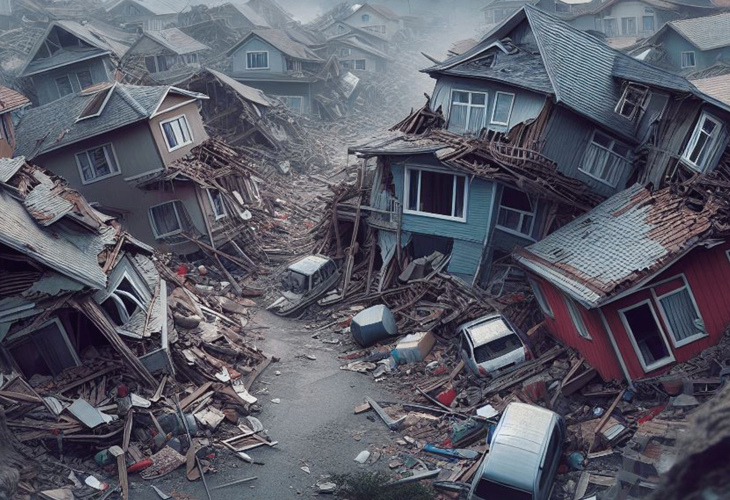Personality Development
Should We Care About Global Tragedies? A Jewish Perspective on Empathy Beyond Borders
Exploring the Torah’s Call to Share in the Pain of Others- Even When Disaster Strikes Far Away

"Did you hear what happened in Patagonia?!" Daniel asked his coworker Avi, visibly shaken.
"No, what happened?" Avi responded.
"There was a massive earthquake, it's devastating. Thousands of people were killed. I just heard about it. It's such a tragedy."
"Wow, that really is terrible," Avi said.
"It was an especially severe quake," Daniel continued. "It will take a long time to fully understand the extent of the damage, but already it's clear that thousands of lives were lost."
Avi paused for a moment to absorb the news. "Okay, but tell me- are there any updates on what we discussed in yesterday’s team meeting?"
"Wait a second. I can’t just move on like that," Daniel said.
Avi didn’t really understand why Daniel was so emotional. "Why are you taking it so personally?" he asked. "At the end of the day, it didn’t happen here. It’s not our people."
"True," Daniel replied, "these were non-Jews, not our own nation. But still, we can’t ignore the pain of others. The death of any human being should move us. We have a responsibility to share in the burden of others' suffering- no matter their nationality."
Avi wasn’t convinced. "We have enough of our own problems. Why should I care about a remote nation I have no connection to? And besides, if you're saying we have to feel their pain, does that mean I'm expected to pray for them or join a rescue mission to the disaster zone?"
"Why not?" said Daniel. "Every human being is a creation of G-d. Why shouldn't we help anyone we can?"
What do you think?
Do you agree with Daniel or Avi? Should we share in the emotional or practical burden of others’ suffering, even if they are not part of our nation?
A Torah Perspective
Rabbi Yechezkel Levenstein, in his sefer Ohr Yechezkel, addressed this very issue: "Even when it comes to an earthquake in a distant land, we are obligated to feel the pain of non-Jews- for even the suffering of animals is prohibited by Torah law (tza'ar ba'alei chayim)."
In one Torah publication, a story was printed about African refugees who perished in a tragedy, along with photos. A reader responded, "Let the enlightened world care about African refugees. We have our own problems". This response is wrong. Even if we cannot help practically, we should still feel their pain.
Non-Jews are also creations of G-d and bear His divine image (tzelem Elokim). Therefore, we should mourn their loss. One of the reasons we don’t say full Hallel during Passover, is because we do not celebrate the downfall of the Egyptians, who were also G-d’s creations.
The deeper issue is that modern media has dulled our sensitivity. We're so overwhelmed by violent headlines and global tragedies that we've become desensitized. Basic compassion has been worn down inside us.
One story about a disciple of Rabbi Yisrael Salanter illustrates this. He once refused to walk a certain path because, in his youth, he had seen Russian forced laborers being brutally abused there. Though they were non-Jews, their pain touched him deeply. His Jewish heart couldn't ignore their suffering. While he surely cared deeply for the Jewish people and believed in aniyei ircha kodmim ("the poor of your city come first"), his heart was large enough to feel the pain of all humanity.
This is also reflected in Temple practice during Sukkot, when 70 offerings were brought on behalf of the nations of the world. The kohanim even prayed for the well-being of the other nations.
From this, one of the great Chassidic masters learned that if disaster strikes one of the world’s nations, anywhere on earth, we Jews must examine ourselves and reflect on what we can improve.
The Talmud states: “Every calamity that happens in the world is meant for the sake of Israel” (Yevamot 63a). When a disaster strikes- even far away, even among non-Jews- G-d is sending a wake-up call to us, to reflect and return to Him.
Weekly Family Practice: Carrying the Burden of Another
This week, focus as a family on the trait of nosei b’ol im chaveiro- sharing another’s burden. Try to notice what your friends or neighbors might need. Help them if you can, or simply say a prayer that G-d should fulfill their needs.
From the book "The Duty of Man in His World - Issues in Morals and Traits for the Whole Family".

